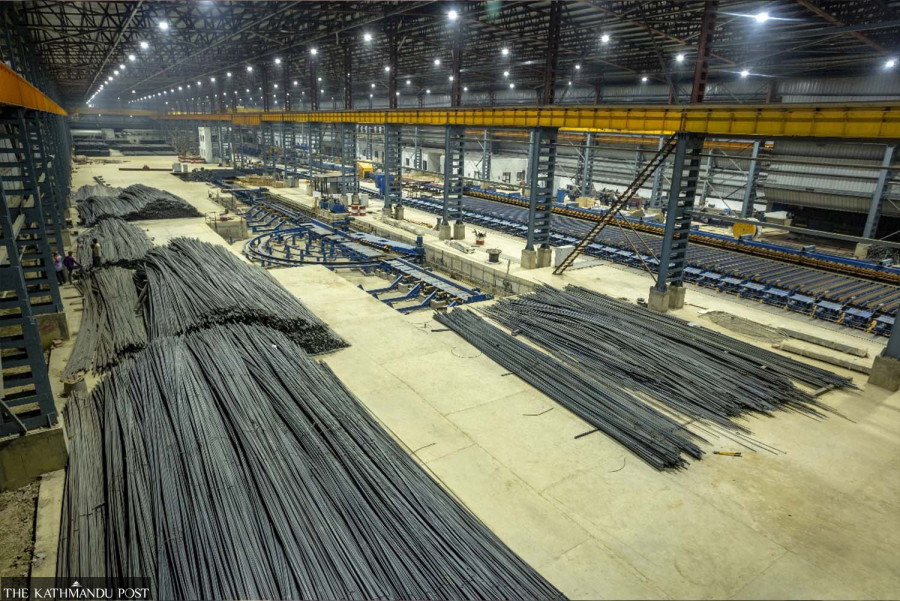Money
India opens Nepali goods exports a crack
Several manufacturers say Indian inspectors have yet to visit their plants, and they fear renewal or issuance of new BIS certificates seems unlikely.
Post Report
India has briefly reopened the export of footwear, sanitary pads, and diapers, granting manufacturers an extended deadline to obtain or renew Bureau of Indian Standards (BIS) certificates.
However, Nepali manufacturers are concerned about what will happen once the deadline expires, as many have yet to secure the required certification.
“The export of sanitary pads and diapers from Nepal has been allowed for three months. It has been a week since imports resumed. Still, we are uncertain about what will happen after April, as our BIS certificate has not been renewed,” said Dol Raj Adhikari, president of the Nepal Sanitary and Diaper Association.
Adhikari added that the renewal process for the BIS certificate was completed 5-6 months ago.
“We anticipated that an inspection team from India would immediately finalise the certification process. But this did not happen,” he said.
Vidushi Rana, executive director of Goldstar Shoes, confirmed that the export of Goldstar shoes to India has resumed.
But she did not elaborate.
Goldstar Shoes faced significant setbacks when exports were halted last September due to delays in obtaining BIS certification. This put the company in a dire position, with a plan to shut down its Bhairahawa factory and lay off workers.
Recently, India agreed to expedite the issuance and renewal of BIS certificates to facilitate the export of Nepali goods, including footwear, plywood, yarn, sanitary pads, diapers, cement, corrugated sheets, and steel products.
This decision followed discussions during the Nepal-India Inter-Governmental Committee (IGC) meeting on Trade, Transit, and Cooperation to Combat Unauthorised Trade, which took place in Kathmandu on January 10.
The two nations also agreed to enhance collaboration between the Nepal Bureau of Standards and Metrology and the Bureau of Indian Standards (BIS) to advance mutual recognition, certification, testing, and quality determination of goods.
Despite these developments, Nepali manufacturers have expressed frustration over persistent delays.
The Ministry of Industry, through the Ministry of Foreign Affairs, has repeatedly informed its Indian counterparts about the challenges and requested changes to the certification process, but responses remain elusive.
Plywood manufacturers, whose exports were initially halted, have been granted certification-free export until March 2025. However, they remain apprehensive about what lies beyond this temporary relief.
“India has not renewed our BIS certificate, even though the process was completed in June,” said a plywood manufacturer who wished not to be named.
The zinc sheet industry is facing similar challenges.
“Our products worth Rs700 million, ready for export to India, have been stranded in different warehouses for nearly four months due to the BIS certificate issue,” said Sunil Manot, chief finance officer of Hulas Steel Industries.
Data from the Nepal Trade Integration Strategy indicates that iron and steel exports fell 27.1 percent to Rs3.36 billion in the first quarter of the current fiscal year. These products command the largest share of Nepal’s exports at 8.76 percent during this period.
Cement manufacturers have also been hard hit.
“Cement production in Bhairahawa has been stalled for 3-4 months due to delays in BIS certification renewal,” said Thakur Kumar Shrestha, president of the Siddhartha Chamber of Commerce and Industry.
“Exports from major cement producers such as Arghakhanchi Cement, Sarbottam Cement, Palpa Cement, and Balaji Cement have come to a complete halt, with many factories operating below capacity or on the verge of shutting down.”
According to the Cement Manufacturers Association of Nepal, a dozen factories applied for BIS certification in 2022 to make their products eligible for export to India. Certification should typically be issued within two months of application, but none of these manufacturers has received it.
The private sector has expressed deep concerns over the BIS-related issues, which have significantly disrupted industries in Rupandehi and other regions.
The certification delays stem from India’s efforts to align imported goods with international quality norms, a measure introduced in 2020 to prevent Chinese products from entering India through neighbouring countries.
This policy has further complicated Nepal’s export landscape, as Indian authorities remain wary of Chinese components in Nepali goods.
India is Nepal’s largest export market, with goods worth Rs103.18 billion exported in the last fiscal year, which ended in mid-July.




 16.12°C Kathmandu
16.12°C Kathmandu













